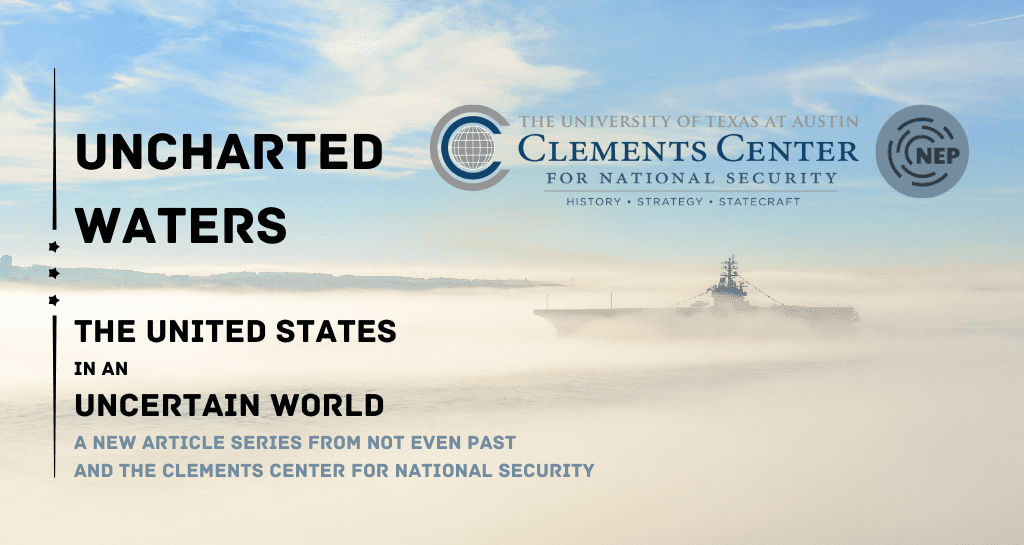
Commentators and scholars have long represented the United States as the supreme guarantor of a well-tempered international order. Today, however, the picture looks far murkier. Agents of American international relations find themselves confronting uncertainty both at home and abroad. New and unpredictable threats to national security, public health, and the global environment loom large on the horizon. Existing institutions and strategic paradigms are struggling to meet the moment. And with domestic political consensus in jeopardy, American policymakers may find it hard to act consistently and with confidence on the world stage.
As they navigate the uncharted waters of global politics, representatives of the United States and its international interlocutors can look to their shared past for insight. There are lessons, some positive, some deeply negative, to be learned in the long, complicated, and often messy history of the United States in the world. Narratives tracing the rise and contours of what has been called American hyperpower form an important part of that history. Equally important, however, are stories about fog-shrouded horizons and unexpected opportunities, stories in which unease, confusion, and leaps into the dark played a decisive role in shaping the outcomes of global events.
In our latest series, “Uncharted Waters,” Not Even Past will bring those stories to life through detailed historical case studies, highlighting moments when American foreign policy agents grappled with the uncertainties of power. Material for the series will come from the cutting-edge research projects like the ones supported by our co-sponsor, the William P. Clements, Jr. Center for National Security at the University of Texas at Austin. Through “Uncharted Waters,” Not Even Past and the Clements Center will show you tantalizing glimpses of global uncertainty past, present, and future.

Articles featured in “Uncharted Waters” will be descriptive, not prescriptive. Instead of advocating for or against specific contemporary policies, they will illuminate a rich past, filled with uncertainty and anxiety, which saw Americans position and reposition themselves across a series of fast-changing global landscapes. Calling attention to the complexity of these international and transnational histories will not solve the problems confronting the United States today. But it will, we hope, provide insight into the current moment. After all, “the past is never dead. It’s not even past.”
Series Overview
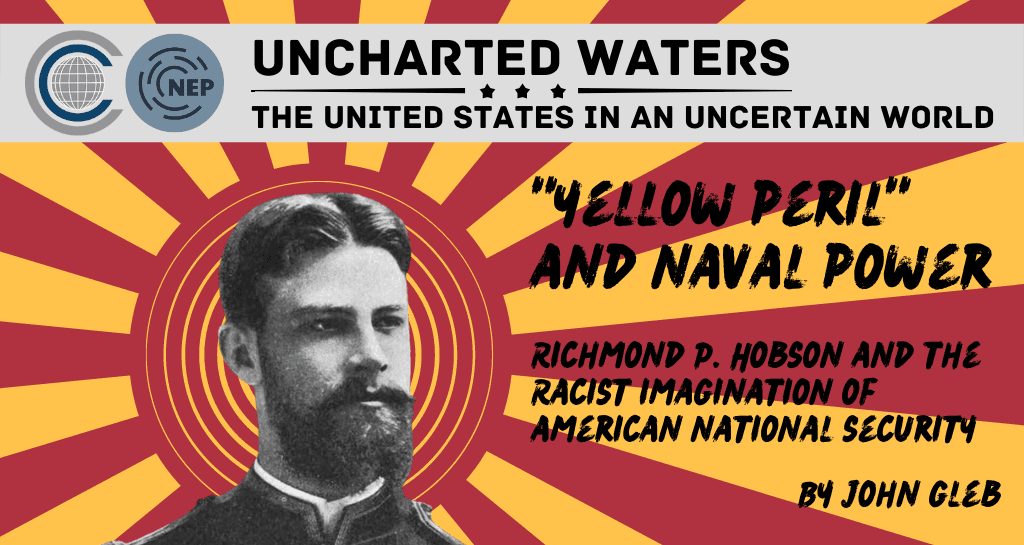
“Yellow Peril” and Naval Power: Richmond P. Hobson and the Racist Imagination of American National Security — by John Gleb
What role has racism played in the history of U. S. national security? In the first installment of “Uncharted Waters,” series creator and NEP Associate Editor John Gleb finds an answer in the hateful career of Richmond P. Hobson, a virulent anti-Asian racist who became a prominent advocate of American naval expansion during the early 1900s. Gleb’s article explains how two closely-related aspects of Hobson’s worldview—his faith in the benevolence of American power and his ugly, racist fear of the so-called “Yellow Peril”—combined to determine how he thought about national security. As Gleb puts it, Hobson’s racist fantasies mattered “both in spite and because of the way they warped the world around him”: “Not only did they condition his responses to political events both at home and abroad; in doing so, they also performed important intellectual work, reinforcing and eventually transforming the underpinnings of his outlook on foreign affairs.”
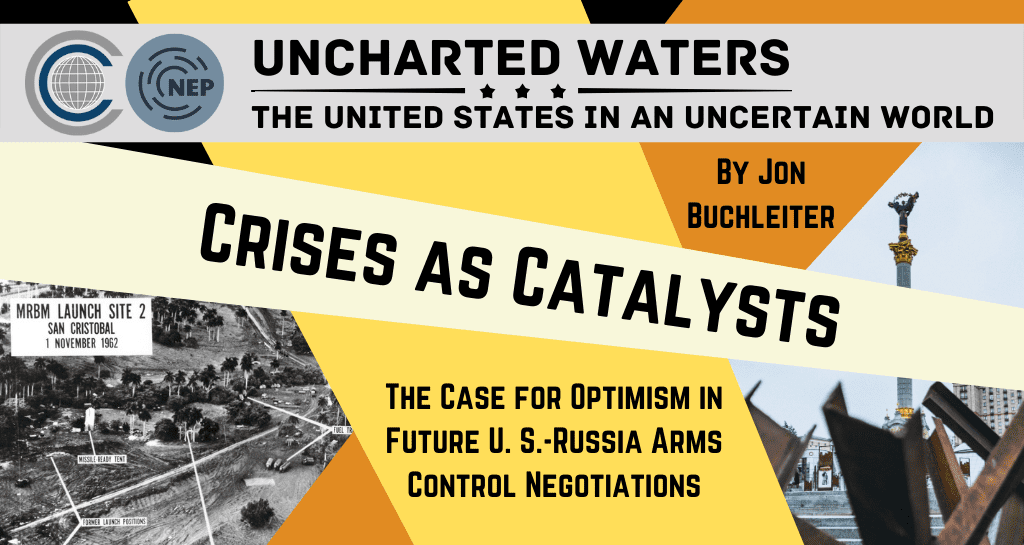
Crises as Catalysts: The Case for Optimism in Future U. S.-Russia Arms Control Negotiations — by Jon Buchleiter
Has the war in Ukraine doomed arms control? Maybe not, posits Clements Center graduate student fellow Jon Buchleiter in the second instalment of “Uncharted Waters.” Buchleiter presents a fresh take on contemporary U. S.-Russia tensions by calling attention to the surprising long-term side effects of the Cuban Missile Crisis, which wound up encouraging leaders on both sides of the Iron Curtain to dial down their Cold War arms race. Originally published to mark the 60th anniversary of the Missile Crisis, Buchleiter’s article demonstrates that episodes of international instability can—under the right circumstances—catalyze rather than derail arms control negotiations. More specifically, the article suggests that “a thoughtful understanding of the Cuban Missile Crisis, its context, and its aftermath can inform U. S. responses to the ongoing upheaval in Ukraine and prepare for a postwar period that may present an opportunity for détente.”
Buchleiter’s conclusions present an interesting contrast to the ones Jeremi Suri drew in a recent Not Even Past feature. It’s also one of several noteworthy responses to the war in Ukraine published by UT-Austin graduate students and faculty.
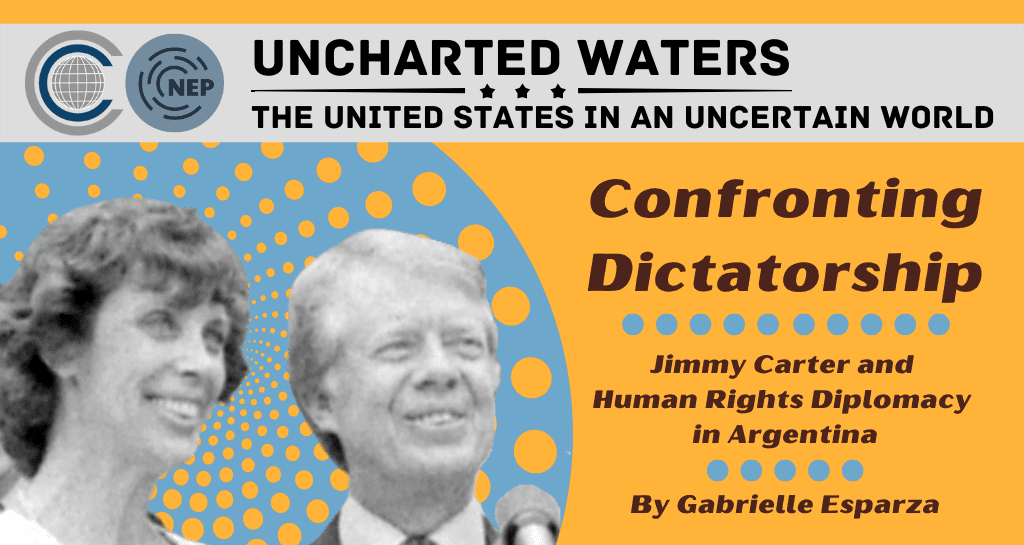
Confronting Dictatorship: Jimmy Carter and Human Rights Diplomacy in Argentina — by Gabrielle Esparza
In its pursuit of order and its search for reliable allies, U. S. foreign policy has often been slow to challenge—and has sometimes actively supported—dictatorship and repression abroad. But with the right kind of support from above, American diplomats can also advance the cause of human rights, special guest author Gabrielle Esparza reminds us in the third instalment of “Uncharted Waters.” Through a careful exploration of U. S.-Argentine relations at the end of the 1970s, Esparza’s article evaluates the transformative presidency of Jimmy Carter, who famously upended Washington’s long-standing alliance with authoritarian anticommunism in Latin America. Esparza explains how this bold political realignment facilitated an equally important shift in the State Department’s institutional culture. “By championing human rights diplomacy,” she concludes, “Carter not only dramatically redefined the U. S. Cold War relationship with Argentina but also expanded the political imaginations of and the range of action available to agents of U. S. foreign policy.”
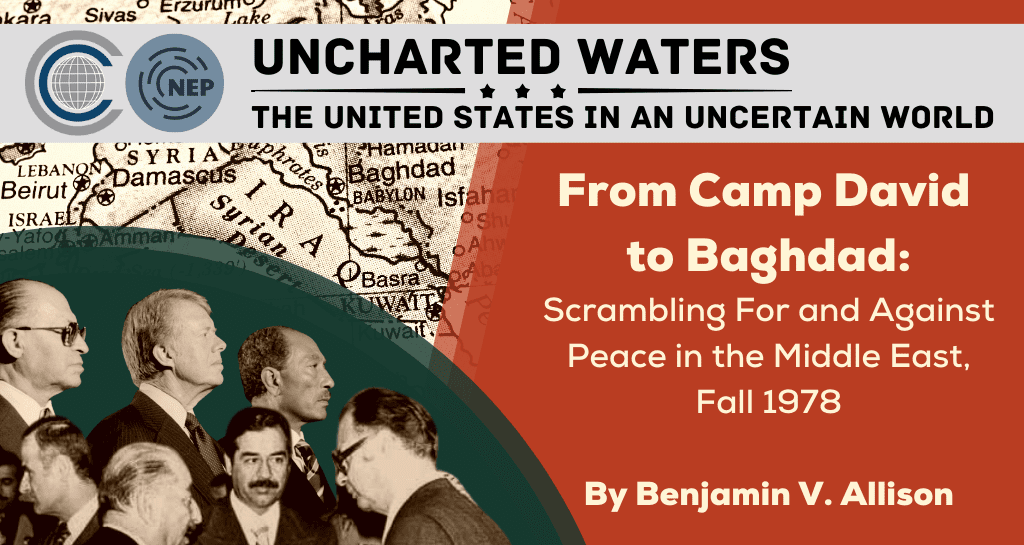
From Camp David to Baghdad: Scrambling For and Against Peace in the Middle East, Fall 1978 — by Benjamin V. Allison
Benjamin V. Allison helped “Uncharted Waters” kick off Spring 2023 by diving deep into the archives. His article—the fourth in our series—analyzes the volatile and multi-layered history of the Arab-Israeli conflict. Highlighting the fragility of the uneasy peace process undergirding the landmark Camp David Accords of 1978, Allison tells a classic Cold War story with an enduring lesson, one the U. S. “has failed to learn time and again”–“a story of how relatively weak states can create significant problems for powerful countries.”
Keep an eye out for the next instalment of Uncharted Waters!
About the Clements Center
The William P. Clements, Jr. Center for National Security at The University of Texas at Austin draws on the best insights of diplomatic and military history to train the next generation of national security leaders. Established in 2013 with the support of distinguished policymakers and scholars, the Clements Center is a nonpartisan research and policy center uniquely positioned in the Office of the President.
The Clements Center honors former Texas Governor Bill Clements and his leadership on national security during his service as Deputy Secretary of Defense from 1973-77. Clements managed the Pentagon and helped guide American national security policy during a critical time. He brought a deep appreciation for history to every aspect of his leadership, policies, and decision-making.
The Clements Center carries forward Bill Clements’ legacy by:
- Teaching students how to integrate the wisdom of history with current challenges in national security and prepare for careers as policymakers and scholars
- Supporting research on history, strategy, and national security policy
- Convening scholars and policymakers to improve our understanding of history, statecraft, and national security



